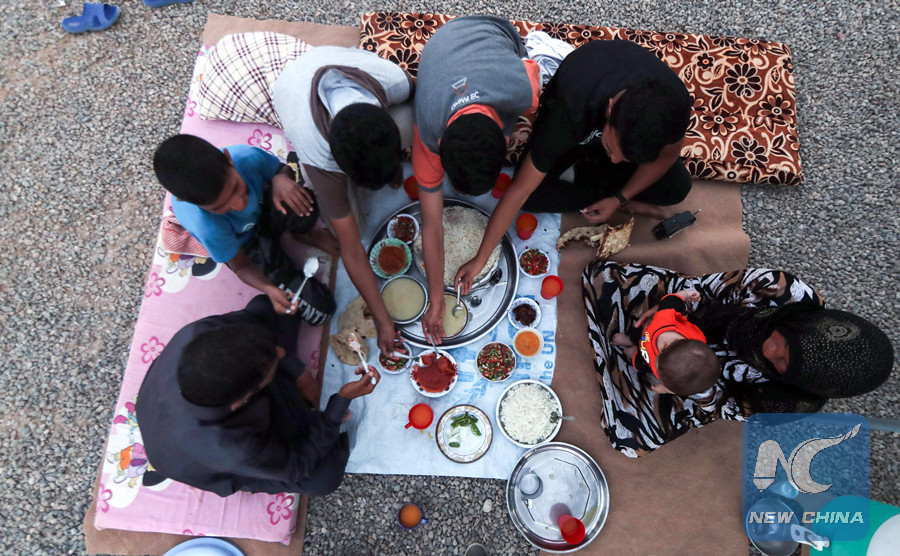
A family breaks fast on the first day of the Muslim holy month of Ramadan, at al-Khazir camp for the internally displaced, located between Arbil and Mosul, on May 27, 2017. (AFP Photo)
MOSUL, Iraq, May 28 (Xinhua) -- It is the early days of the holy month of Ramadan. Everybody seeks for pleasure of Ramadan's traditional games, buying new clothes and different kinds of food for Iftar (break the daylight fasting).
Ramadan is an Islamic religious observance of the ninth month of the Islamic lunar calendar. It begins with the sight of the new moon and continues for 30 days.
For Muslims, Ramadan is considered the holiest month of the Islamic year. They all respect Ramadan which is characterized by fasting through the entire month from dawn until sunset, as they refrain from eating, drinking and all sinful thoughts and deeds.
However, for the people of the battleground city of Mosul, Ramadan's traditions are still luxuries although many of the residents feel they have somehow regained the special taste of the holy month as life is returning to normal.
"No way to compare Ramadan this year with the previous Ramadan. We were living in prison. Everything was forbidden; I can't go to market alone and I must wear hijab," said Um Karam, in her 40s, as she was walking without hijab at a popular market in one of the newly-liberated neighborhoods from the extremist Islamic State (IS) militants.
The fasting month of Ramadan has its special taste and smell with Iraqis, who used to spend its long nights with much of fun and traditional activities.
"I love Ramadan because it makes me feel connected in myself, with my family and with my people. I am happy to bring my life back, like before Daesh (IS group), and I will be happier if the security forces free all the remaining areas in Mosul and all Iraq from the rule of the terrorist group," Karam told Xinhua while shopping for food and juices for Iftar table of her family.
Traditionally, the life in Ramadan used to be more like celebrations, when all family members and sometimes friends would gather to break their fast at Iftar, which is normally a rich evening meal for breaking the dawn-to-sunset fast, with a variety of dishes.
Also in Ramadan tradition, families sometimes go for a walk to the crowded thoroughfare in their neighborhoods, and some youngsters would gather at ice cream shops or at coffee houses to play games only played in Ramadan.
In Mosul, the residents were deprived from Ramadan's traditions and relaxation and were forced to follow the brutal rules of the extremist IS group.
Nowadays in the liberated areas people have started to regain their old nights of fun in Ramadan. Not exactly like they wish, but this is the beginning.
"The mood of the customers has changed this Ramadan for the better, because people feel safer and their families are more secure after we've got rid of Daesh," said Thanoon Younis, owner of a convenient store in a crowded market in Mosul.
However, Younis complained of the slow movement of the shopping as many of Mosul's families are still living in camps outside the city for the lack of basic services like drinking water. People still rely on water of wells.
"The life is returning gradually, especially on the left bank of Mosul (eastern side of Mosul), because it is safer by the victories of the security forces over the terrorists," Younis said.
Most of the traditional games and activities of Ramadan were cancelled by the IS militants, who were roaming the streets and alleys to look for whoever breaks their extremist laws and instructions.
"What's new in this year is the return of those traditions and games of Ramadan, like the one I like: Mehiebes. We are playing the game again," Younis said with joy on his face.
The Mehiebes, or the hidden ring, is an Iraqi communal game played by different ages of men who are divided into two teams. It gives the holy month its unique flavor. The winners will get large plates of popular Iraqi sweets, named Zalabiyah and Baqlawa, but traditionally the sweets are handed out to all the players and the audience during or after the game.
Meanwhile, Younis expressed his serious concerns about the tragedies and suffering of the people who are still living in the IS-controlled areas in the western side of Mosul.
"We pray for the innocent people inside and near the old city center. I am always thinking about their miserable life, their hunger, thirst and daily killings," Younis said.
According to the UN Office for the Coordination of Humanitarian Affairs (OCHA), the number of civilians remaining in the old city and surrounding neighborhoods cannot be known exactly, but the office estimated 200,000 may leave their homes in the coming days of battles.
"We don't know for sure how many civilians are still in IS-held districts, but as many as 200,000 additional people may try to leave in coming days," an OCHA report said on Friday.
Iraqi forces, backed by international coalition, have been fighting to drive out IS militants from the western side of Mosul, but several neighborhoods, including the densely-populated old city center, are still under control of the extremist group.
According to the Iraqi military, over 90 percent of the city has been retaken from IS in the ongoing major offensive launched in October last year.
Mosul, 400 km north of Iraq's capital Baghdad, has been under IS control since June 2014, when government forces abandoned their weapons and fled, enabling IS militants to take control of parts of Iraq's northern and western regions.

